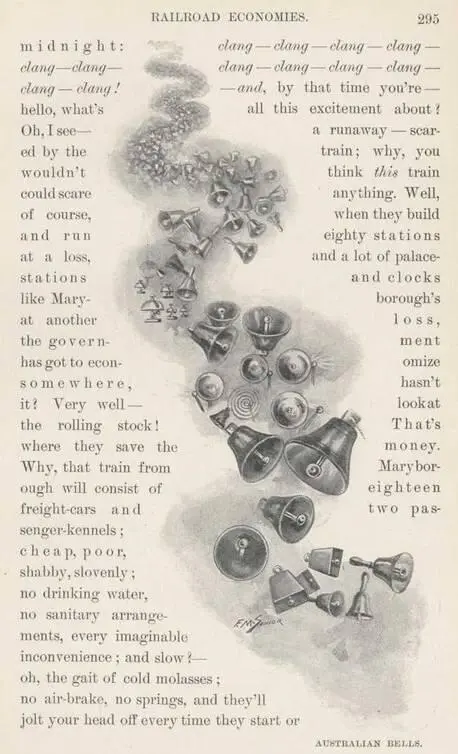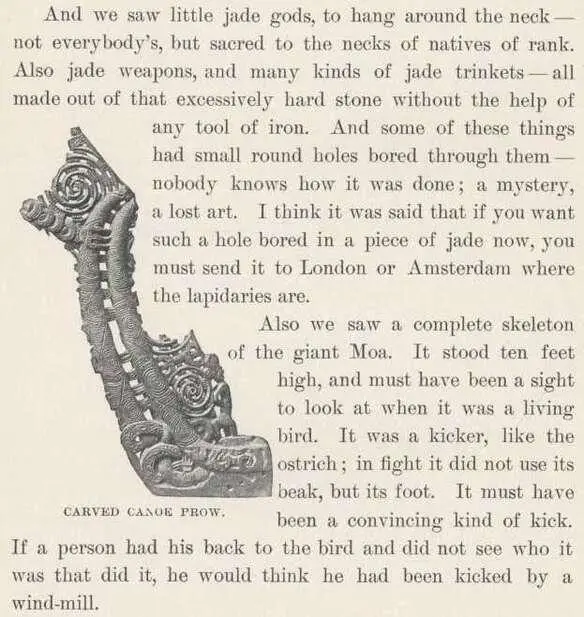Mark Twain - Following the Equator
Здесь есть возможность читать онлайн «Mark Twain - Following the Equator» весь текст электронной книги совершенно бесплатно (целиком полную версию без сокращений). В некоторых случаях можно слушать аудио, скачать через торрент в формате fb2 и присутствует краткое содержание. Год выпуска: 2004, Жанр: Классическая проза, Юмористическая проза, на английском языке. Описание произведения, (предисловие) а так же отзывы посетителей доступны на портале библиотеки ЛибКат.
- Название:Following the Equator
- Автор:
- Жанр:
- Год:2004
- ISBN:нет данных
- Рейтинг книги:3 / 5. Голосов: 1
-
Избранное:Добавить в избранное
- Отзывы:
-
Ваша оценка:
- 60
- 1
- 2
- 3
- 4
- 5
Following the Equator: краткое содержание, описание и аннотация
Предлагаем к чтению аннотацию, описание, краткое содержание или предисловие (зависит от того, что написал сам автор книги «Following the Equator»). Если вы не нашли необходимую информацию о книге — напишите в комментариях, мы постараемся отыскать её.
Following the Equator — читать онлайн бесплатно полную книгу (весь текст) целиком
Ниже представлен текст книги, разбитый по страницам. Система сохранения места последней прочитанной страницы, позволяет с удобством читать онлайн бесплатно книгу «Following the Equator», без необходимости каждый раз заново искать на чём Вы остановились. Поставьте закладку, и сможете в любой момент перейти на страницу, на которой закончили чтение.
Интервал:
Закладка:

On every quarter-hour, night and day, they jingle a tiresome chime of half a dozen notes—all the clocks in town at once, all the clocks in Australasia at once, and all the very same notes; first, downward scale: mi, re, do, sol—then upward scale: sol, si, re, do—down again: mi, re, do, sol—up again: sol, si, re, do—then the clock—say at midnight clang—clang—clang—clang—clang—clang—clang—clang—clang— clang——and, by that time you're—hello, what's all this excitement about? Oh I see—a runaway—scared by the train; why, you wouldn't think this train could scare anything. Well, of cours, when they build and run eighty stations at a loss and a lot of palace-stations and clocks like Maryborough's at another loss, the government has got to economize somewhere hasn't it? Very well look at the rolling stock. That's where they save the money. Why, that train from Maryborough will consist of eighteen freight-cars and two passenger-kennels; cheap, poor, shabby, slovenly; no drinking water, no sanitary arrangements, every imaginable inconvenience; and slow?—oh, the gait of cold molasses; no air-brake, no springs, and they'll jolt your head off every time they start or stop. That's where they make their little economies, you see. They spend tons of money to house you palatially while you wait fifteen minutes for a train, then degrade you to six hours' convict-transportation to get the foolish outlay back. What a rational man really needs is discomfort while he's waiting, then his journey in a nice train would be a grateful change. But no, that would be common sense—and out of place in a government. And then, besides, they save in that other little detail, you know—repudiate their own tickets, and collect a poor little illegitimate extra shilling out of you for that twelve miles, and——"
"Well, in any case——"
"Wait—there's more. Leave that American out of the account and see what would happen. There's nobody on hand to examine your ticket when you arrive. But the conductor will come and examine it when the train is ready to start. It is too late to buy your extra ticket now; the train can't wait, and won't. You must climb out."
"But can't I pay the conductor?"
"No, he is not authorized to receive the money, and he won't. You must climb out. There's no other way. I tell you, the railway management is about the only thoroughly European thing here—continentally European I mean, not English. It's the continental business in perfection; down fine. Oh, yes, even to the peanut-commerce of weighing baggage."
The train slowed up at his place. As he stepped out he said:
"Yes, you'll like Maryborough. Plenty of intelligence there. It's a charming place—with a hell of a hotel."
Then he was gone. I turned to the other gentleman:
"Is your friend in the ministry?"
"No—studying for it."
CHAPTER XXXII.
The man with a new idea is a Crank until the idea succeeds.
—Pudd'nhead Wilson's New Calendar
Description of the Town of Christ Church—A Fine Museum—Jade-stone Trinkets—The Great Moa—The First Maori in New Zealand—Women Voters—"Person" in New Zealand Law Includes Woman—Taming an Ornithorhynchus—A Voyage in the 'Flora' from Lyttelton—Cattle Stalls for Everybody—A Wonderful Time.
It was Junior England all the way to Christchurch—in fact, just a garden. And Christchurch is an English town, with an English-park annex, and a winding English brook just like the Avon—and named the Avon; but from a man, not from Shakespeare's river. Its grassy banks are bordered by the stateliest and most impressive weeping willows to be found in the world, I suppose. They continue the line of a great ancestor; they were grown from sprouts of the willow that sheltered Napoleon's grave in St. Helena. It is a settled old community, with all the serenities, the graces, the conveniences, and the comforts of the ideal home-life. If it had an established Church and social inequality it would be England over again with hardly a lack.
In the museum we saw many curious and interesting things; among others a fine native house of the olden time, with all the details true to the facts, and the showy colors right and in their proper places. All the details: the fine mats and rugs and things; the elaborate and wonderful wood carvings—wonderful, surely, considering who did them—wonderful in design and particularly in execution, for they were done with admirable sharpness and exactness, and yet with no better tools than flint and jade and shell could furnish; and the totem-posts were there, ancestor above ancestor, with tongues protruded and hands clasped comfortably over bellies containing other people's ancestors—grotesque and ugly devils, every one, but lovingly carved, and ably; and the stuffed natives were present, in their proper places, and looking as natural as life; and the housekeeping utensils were there, too, and close at hand the carved and finely ornamented war canoe.
And we saw little jade gods, to hang around the neck—not everybody's, but sacred to the necks of natives of rank. Also jade weapons, and many kinds of jade trinkets—all made out of that excessively hard stone without the help of any tool of iron. And some of these things had small round holes bored through them—nobody knows how it was done; a mystery, a lost art. I think it was said that if you want such a hole bored in a piece of jade now, you must send it to London or Amsterdam where the lapidaries are.

Also we saw a complete skeleton of the giant Moa. It stood ten feet high, and must have been a sight to look at when it was a living bird. It was a kicker, like the ostrich; in fight it did not use its beak, but its foot. It must have been a convincing kind of kick. If a person had his back to the bird and did not see who it was that did it, he would think he had been kicked by a wind-mill.
There must have been a sufficiency of moas in the old forgotten days when his breed walked the earth. His bones are found in vast masses, all crammed together in huge graves. They are not in caves, but in the ground. Nobody knows how they happened to get concentrated there. Mind, they are bones, not fossils. This means that the moa has not been extinct very long. Still, this is the only New Zealand creature which has no mention in that otherwise comprehensive literature, the native legends. This is a significant detail, and is good circumstantial evidence that the moa has been extinct 500 years, since the Maori has himself—by tradition—been in New Zealand since the end of the fifteenth century. He came from an unknown land—the first Maori did—then sailed back in his canoe and brought his tribe, and they removed the aboriginal peoples into the sea and into the ground and took the land. That is the tradition. That that first Maori could come, is understandable, for anybody can come to a place when he isn't trying to; but how that discoverer found his way back home again without a compass is his secret, and he died with it in him. His language indicates that he came from Polynesia. He told where he came from, but he couldn't spell well, so one can't find the place on the map, because people who could spell better than he could, spelt the resemblance all out of it when they made the map. However, it is better to have a map that is spelt right than one that has information in it.
In New Zealand women have the right to vote for members of the legislature, but they cannot be members themselves. The law extending the suffrage to them went into effect in 1893. The population of Christchurch (census of 1891) was 31,454. The first election under the law was held in November of that year. Number of men who voted, 6,313; number of women who voted, 5,989. These figures ought to convince us that women are not as indifferent about politics as some people would have us believe. In New Zealand as a whole, the estimated adult female population was 139,915; of these 109,461 qualified and registered their names on the rolls 78.23 per cent. of the whole. Of these, 90,290 went to the polls and voted—85.18 per cent. Do men ever turn out better than that—in America or elsewhere? Here is a remark to the other sex's credit, too—I take it from the official report:
Читать дальшеИнтервал:
Закладка:
Похожие книги на «Following the Equator»
Представляем Вашему вниманию похожие книги на «Following the Equator» списком для выбора. Мы отобрали схожую по названию и смыслу литературу в надежде предоставить читателям больше вариантов отыскать новые, интересные, ещё непрочитанные произведения.
Обсуждение, отзывы о книге «Following the Equator» и просто собственные мнения читателей. Оставьте ваши комментарии, напишите, что Вы думаете о произведении, его смысле или главных героях. Укажите что конкретно понравилось, а что нет, и почему Вы так считаете.











